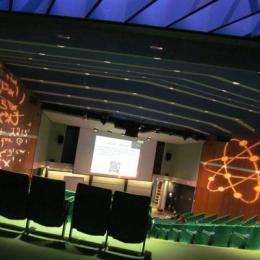'Flipped classroom' teaching model gains an online community

Researchers at Harvard University have launched the Peer Instruction (PI) Network, a new global social network for users of interactive teaching methods.
PI, developed by Eric Mazur, Area Dean for Applied Physics and Balkanski Professor of Physics and Applied Physics at the Harvard School of Engineering and Applied Sciences (SEAS), is an innovative evidence-based pedagogy designed to improve student engagement and success.
Mazur, famous for his talk titled "Confessions of a Converted Lecturer," developed the method after realizing in the 1990s that his physics lectures at Harvard, while popular, were not helping students to master the basic concepts.
The PI technique relies on the power of the "flipped classroom." Information transfer (i.e., a teacher transferring knowledge to students) takes place in advance, typically through online lectures. In short, students study before rather than after class.
As a result, the classroom becomes a place for active learning, questions, and discussion. Instructors spend their time addressing students' difficulties rather than lecturing.
While originally developed for Mazur's introductory physics courses, PI is now used across multiple disciplines, from the sciences to the humanities.
The Peer Instruction Network will serve as a hub for educators around the world to connect and share their PI experiences, submit questions, and engage with other PI users.
"In the first phase of community building we are aiming to register current and potential users of Peer Instruction," said Julie Schell, Co-Founder of the Peer Instruction Network and a senior education postdoctoral fellow in the Mazur Group at SEAS.
"So far, the response has been remarkable," Schell said. "More than 1,900 educators from elementary schools to research universities worldwide, including those in Ethiopia, Israel, Singapore, Vietnam, Finland, Germany, Greece, South Africa, and places like South Dakota, New York City, New Orleans and Oklahoma, have joined the Network."
Testimonials from network registrants suggest why PI is rapidly becoming a pedagogy of choice: It works.
A science professor wrote on the site: "I use the technique so extensively that I've moved my lectures from 'live' to video podcasts that the students view before coming to class. In-class 'lecture' time is now devoted to Peer Instruction, worksheets, and physics demonstrations. Works great!"
At Harvard, Mazur and his team have long been encouraging other faculty to experiment with Peer Instruction in their own courses. With support from Cherry A. Murray, Dean of the Harvard School of Engineering and Applied Sciences (SEAS), he has even used it to better engage faculty at faculty meetings and retreats.
"We are amazed by the response to the initial launch of the Peer Instruction Network," said Mazur. "By connecting people who use interactive teaching methods, we hope to cultivate a community of practice that will have a global effect on educational change."
Provided by Harvard University
















